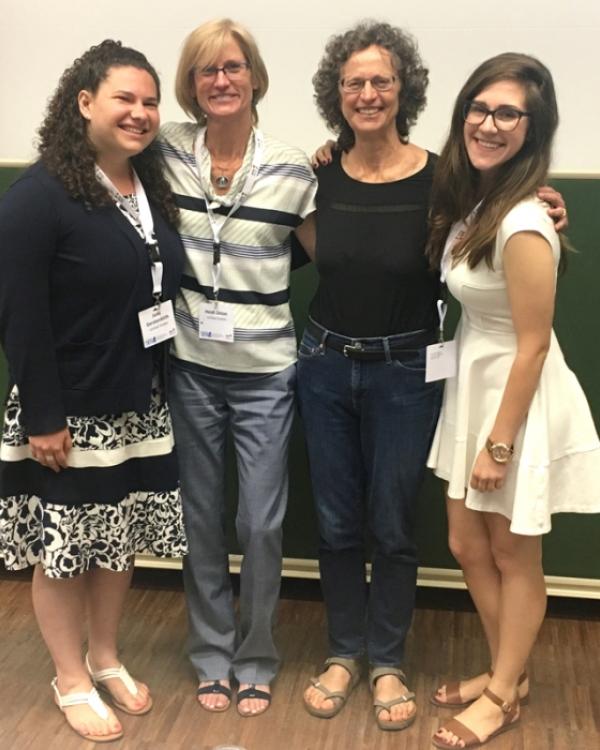
Heidi Zetzer (second from left) with other members of the panel “Diverse Perspectives on the Relationship between the Supervisory and Therapeutic Alliance:" (l-r) Judith Girstenblith, Clara E. Hill, Kathryn Kline
Heidi Zetzer of UC Santa Barbara’s Gevirtz School served as moderator of the panel “Diverse Perspectives on the Relationship between the Supervisory and Therapeutic Alliance” at the International Meeting of the Society for Psychotherapy Research in Amsterdam, Netherlands in June 2018.
Psychotherapy outcomes improve during graduate school and plateau and then deteriorate over the course of psychologists’ careers (Goldberg, Rousmaniere, et al., 2016). Given that supervision is required during graduate training, it stands to reason that supervision plays an important role during the most critical period of skill development. Furthermore, strong supervisory alliances are a necessary condition for growth and are correlated with supervisee satisfaction (Ellis et al., 1999; Son et al., 2007), self-disclosure in supervision (Ladany et al., 1996), and the quality of supervisees’ working alliances with clients (Hilsenroth, et al., 2015; Wampold & Imel, 2015). Given the importance of the therapeutic alliance in predicting patient outcome (Horvath et al., 2011), it is a “wise supervisor” who attends to both alliances.
The purpose of this panel was to integrate diverse perspectives (client, therapist, and supervisor) and research methods (HLM and CQR) in investigations of the therapeutic and supervisory alliances. Presenter 1 reported on a quantitative study on the therapeutic and supervisory working alliance from the client and supervisee’s perspective. Presenter 2 reported on a quantitative study on the therapeutic and supervisory alliance from the client and supervisor’s perspective. Presenter 3 reported on a qualitative study of parallel process as a vehicle for understanding the therapeutic and supervisory alliances from eleven supervisors' perspectives. The discussant integrated the findings and offered insights.
Zetzer also gave one of the papers at the presentation, “Parallel Process and the Supervisory and Therapeutic Alliance.” This paper was co-authored by current Department of Counseling, Clinical and School Psychology (CCSP) doctoral student Evelyn Plumb and CCSP alumnae Rachel Hopsicker, Anna Krasno, Patti C. Montojo, and Megan Donahue.
Heidi Zetzer is a Lecturer with Security of Employment (LSOE) in the Department of Counseling, Clinical, and School Psychology and the Director of the Hosford Counseling & Psychological Services Clinic, which is the department’s psychology training clinic. Zetzer is also an alumna of the Gevirtz School.